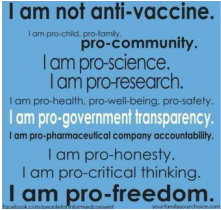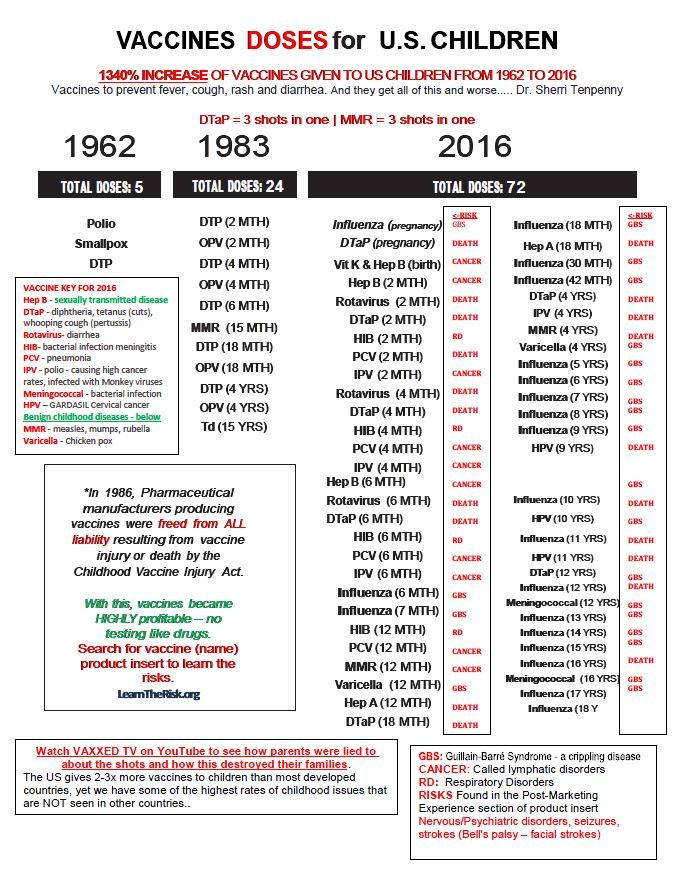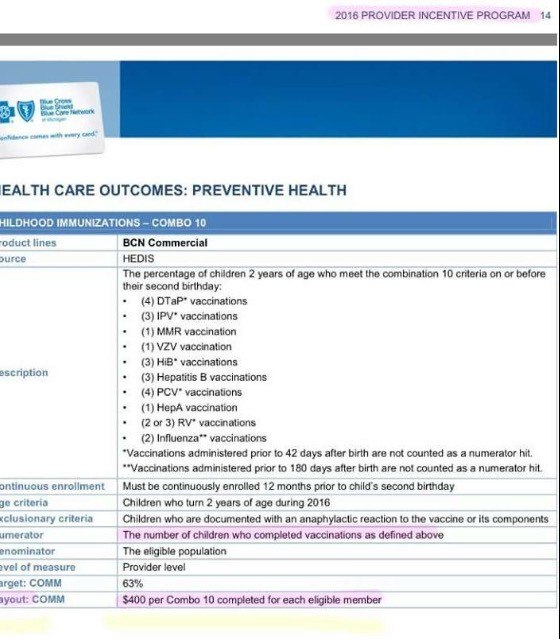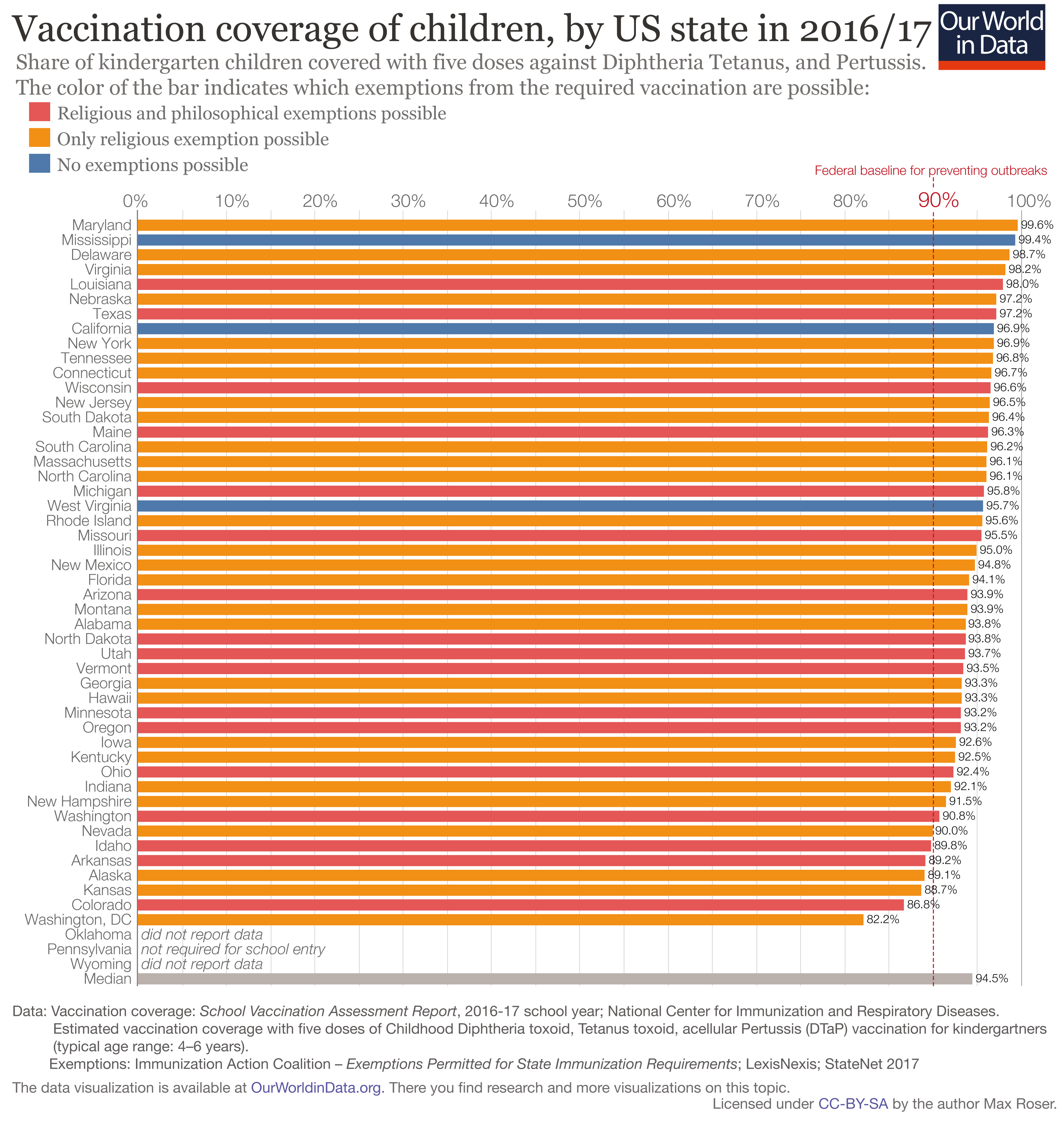I am not anti-vaccine; rather, I am pro-freedom. I oppose vaccination mandates, while remaining open to individuals’ choices of whether to vaccinate themselves and their children. I support the ideas of training one’s immune system and of building one’s immunity. The science and history of inoculation and immunization theory is fascinating, but beyond the scope of this post. Here, I will simply cover my reasons against government coerced, mandatory vaccination. Please keep in mind, I am not a medical professional and what I write should not be considered medical advice. Do your own research, make your own choices, and consult your medical experts, as needed.
Mandatory vaccination should be opposed for three main reasons: 1) it strips a person of liberty, 2) it is established on unethical foundations, and 3) there are good reasons to question the safety of vaccines.
The hyperlinks I provide vary widely. Some are from reputable medical journals. Others are from “sensational” news sources. However, I believe they are important to include because some information is censored by the mainstream media, and because these sources are not receiving compensation from pharmaceutical companies. In addition, many provide hyperlinks to primary and other sources for readers to explore. Even if you feel distrustful of some of these sources, they are balanced with a plethora of primary sources, package inserts, and scientific studies. We shouldn’t be afraid of facts, wherever they may be found, and so, I’ve cast a broad net with my research.
I. Liberty: Mandatory Vaccination Strips a Person of Liberty
A. Mandatory Vaccination Is a Human Rights Violation.
Human beings have the right to bodily autonomy. They should be allowed to choose for themselves which medical services to pursue and what to put into their bodies. Mandatory vaccination violates that choice, even if it is supposedly toward a “good” end. If our legislators breach this boundary, citizens have no assurance that their bodies are safe from any other decision—implants, euthanasia, sterilization—that authority feels is for a greater “good.”
B. Mandatory Vaccination Is an Affront to the Constitutional Rights of Religion and Conscience.
Would you let your state or federal representatives decide whether or not to circumcise your son? Or choose the gender of your child? Part of what makes our communities great is personal, medical, and religious diversity, particularly when it comes to something as intimate as your own body and what goes into it. Whether or not vaccination is included in an official religious doctrine is irrelevant. All people should be tolerant of an individual’s decision to choose vaccination, or not.
C. Mandatory Vaccination Disregards Biomedical Individuality.
It goes without saying that none of us is exactly the same as the other! Until lawmakers have interviewed every single individual in their jurisdictions, the legislature cannot dictate what is medically necessary or contradicted for every single individual. This is why we choose our own doctors and practitioners. In fact, the vast majority of lawmakers have no background in medicine and should not be practicing medicine without a license by forcing a medical procedure onto the populace.
D. Mandatory Vaccination Victimizes the Poor.
Vaccination costs money. It costs thousands of dollars to vaccinate a single child. Alternatively, the costs of vaccine injury are extremely high in terms of both medical expense and emotional payout. The poor, who cannot or do not purchase medical insurance, or who have been affected by vaccine injury, are disproportionately burdened by a mandatory vaccination law. A mandate would force citizens to make a purchase goods from a monopoly. That is not freedom.
E. Mandatory Vaccination Opposes the Right to Privacy and Equal Access to Education.
The Supreme Court has interpreted the Fourteenth Amendment to include a citizen’s rights to equal educational opportunity and also to privacy. Shouldn’t it be consistent to conclude that public school districts have no right to individuals’ medical records and should not restrict educational access based on those records? Public education has becomes a vaccination gatekeeper, when medical information ought to be private. Mandatory vaccination does not help teachers educate their students and would, in fact, discriminate against children who are not vaccinated.
F. Mandatory Vaccination Uses Coercion Rather Than Education.
If legislators think the unvaccinated are ignorant, they should pass legislation to educate them, not take away their foundational liberties. While I support education, I do not support mandatory vaccination education which tends toward indoctrination. Mandatory vaccination education ought to be offered by unbiased third-party researchers, not doctors receiving funding from the vaccine industry (see B under Unethical Foundations). In addition, doctors are not trained in religion or matters-of-conscience, and should not to presume to educate their patients on these. Therefore, it is vital that legislators protect individuals’ right to conscientious objection to vaccination and reject mandatory vaccine education.
G. Mandatory Vaccination Restricts Parental Responsibility.
Children are not born to governments, they are entrusted to parents who are responsible for raising and caring for them. Who loves an individual child more than his parents? Do teachers? Do doctors? Do legislators? Of course not! Due to diversity, one parent’s choices for his or her child may not look like another’s. But those differences do not mean a lack of love. Mandatory vaccination is an affront to love, the powerful love between parents and children. No one should be coerced to vaccinate oneself or one’s child for some supposed “greater good.” Rather, we should each be responsible for our own health and our own choices. When negative consequences may be involved on either side of a decision, a person has the right to choose to abstain from that action on behalf of their children.
H. Mandatory Vaccination Refuses to Learn from Thousands of Years of History.
Any student of history knows that the government, the media, and the medical establishment have been wrong about things in the past. Consider lack of handwashing prior to surgery, drinking alcohol while pregnant, babies sleeping on their stomachs, blood-letting, genocide, the Holocaust, and discrimination. What ideas of today will we know in the future are wrong? Isn’t it at least conceivable that vaccines could be causing more harm than good? The most intelligent people know that they are not infallible. Not everything that could be tested has been tested. We learn as we go. Mandatory vaccination takes away this dialog and the right to choose.
II. Ethics: Mandatory Vaccination Is Established on Unethical Foundations.
A. Pharmaceutical Companies Are Exempt from Liability for Damage from Their Products.
In 1986, under extreme pressure from Congress, President Ronald Reagan signed into law a bill which protected vaccine manufacturers against vaccine-related injuries. With the doors wide-open for a product-line for which they could not be sued, pharmaceutical companies added new vaccines to their recommendations a few at a time. For which other industry does the government give legal immunity when a product fails? And with such immunity, why would the industry ever stop creating and recommending more vaccines and additional boosters, whether or not they work?
B. America’s Vaccination Paradigm Is Rife with Conflicts of Interest.
Pharmaceutical Companies: The businesses selling vaccines can only stay in business if they have sick customers. If and when injury is caused by vaccination, they now have additional customers. (Remember that they can’t be sued for faulty products.) Also, members of the CDC and FDA that are responsible for research and licensing of vaccines have financial interests in vaccination. Is it any wonder, then, that pharmaceutical industries spend more on marketing than they do on research? With legal immunity, pharmaceuticals have no reason to ever stop creating and recommending new booster doses or new vaccines. There may even be 609 new vaccines in the pipeline.
Taxpayers: Since vaccine manufacturers are not liable for vaccine injury, who is paying injured families when they win in court? Well, the taxpayers are. You. If our government really wanted to protect families (not the vaccine industry), it would funnel our money toward unbiased testing done by disinterested third-party researchers. In addition, if mandatory vaccination legislation passed, the taxpayers would also be responsible for the additional financial burden of enforcing that legislation.
The Government: Pharmaceutical companies lobby and donate to politicians. The government should not mandate vaccination while it keeps ties to these companies. There is an obvious conflict of interest.
Doctors: Although many have altruistic goals in mind, some doctors and clinics are not disinterested parties when it comes to vaccination, either. They often receive money from pharmaceutical companies for promotion of their products.
C. Doctors and Vaccine Companies Do Not Provide True Informed Consent.
Risks of Vaccination in General: No scientific study proves that injecting microorganisms, chemicals, and foreign DNA into a healthy person is safe. In fact, the CDC literature provided to families admits death is a real possibility after vaccination. But what those handouts do not tell families is the prevalence of vaccine injury. It isn’t as rare as one might expect, and the number of victims is on the rise. In fact, studies estimate that only 1% of actual injuries are reported! In addition, pharmaceutical companies only follow their test subjects for a matter of days, so any risk disclosed on the fact sheets does not take into account long-term risks, which haven’t been studied.
In addition to the inherent risk of vaccination itself, the vaccination process can be fraught with human error. From the manufacturing process, to the record-keeping and administration of the vaccine itself, people make mistakes and vaccines can be tainted. No government entity, medical professional, or pharmaceutical representative can honestly believe that humans are infallible when it comes to vaccination.
Risks from Vaccine Ingredients: In addition, consumers are not normally informed of vaccination ingredients at their appointments. More will be said about individual ingredients below, but for now, let’s focus solely on one’s right to be informed about ingredients in general. When probed about ingredients, most nurses and doctors will say ingredients are “safe,” but the term “safe” is left unqualified, especially when one considers that even the package inserts admit that vaccination holds inherent risks. Also, many consumers would be shocked to discover that some vaccinations contain a live virus that the person intends to be protected against! St. Jude’s Hospital recommends that visitors who have been recently vaccinated avoid contact with their immuno-suppressed loved-one because of viral shedding. Vaccination is promoted as guaranteed protection against disease, yet several vaccines administered do not give that protection.
Risk-Factors for Illnesses: Vaccinations are available for a wide variety of illnesses, not all of which are equal. Many vaccines have been formulated against illnesses which are only dangerous for the first few months of life. Some are created to protect against illnesses which are only contracted by risky behavior. You may have no risk factors for an illness, and yet be encouraged to be vaccinated against it. There is no good reason for this. Most illnesses for which vaccines are formulated are rarely deadly; but vaccine injury can be devastating.
Risk-Factors for Childhood Vaccination Schedule: Neil Z. Miller explains in a scientific journal that while individual vaccines are studied to some extent, the entire vaccine schedule a whole has not been studied adequately. One vaccine may appear safe, but the co-administration of dozens of them injected over a few months or years has not been studied.
“The safety of CDC’s childhood vaccination schedule was never affirmed in clinical studies. Vaccines are administered to millions of infants every year, yet health authorities have no scientific data from synergistic toxicity studies on all combinations of vaccines that infants are likely to receive. National vaccination campaigns must be supported by scientific evidence. No child should be subjected to a health policy that is not based on sound scientific principles and, in fact, has been shown to be potentially dangerous.” from Journal of American Physicians and Surgeons, Volume 21, Number 2, Summer 2016
Instead of providing factual information about the risks and benefits of vaccination so consumers can make their own educated decision and give informed consent, proponents of vaccination resort to fear-mongering. If these shots work, why is the community afraid of those exercising their freedom of choice? Herd-immunity levels are already largely met. The government, pharmaceuticals, and doctors seem to not recognize the logical fallacy of the false dichotomy they present the public. Citizens have more than two choices: to vaccinate or to be diseased. There are many ways to boost immunity and there are many treatments for common illnesses. To provide true informed consent to consumers, breastfeeding, homeoprophylaxis, herbal remedies, vitamin C treatment, and the benefits of natural immunity need to be explored, in addition to truly disclosing the risks associated with vaccines.
III. Safety: The Safety of Vaccines Is Questionable.
A. Vaccines Contain Controversial Ingredients.
Vaccines contain chemicals and additives. It is difficult to imagine that the introduction of viruses, bacteria, pathogens, preservatives, metals, animal DNA, and dozens of other chemicals into the body of an infant could be harmless. Check individual package labels. Even if folks in the pro-vaccine camp say that these ingredients are included in such tiny quantities that they don’t matter, then why don’t the vaccination companies take them out or change them to something less controversial? Experts say, “...ingredients have not been found to be harmful...,” but that is not the same thing as “...ingredients have been proven to be safe...” The industry cannot prove those substances cause no harm long-term, because they don’t do long-term studies at all. If vaccine ingredients are “safe,” why did Federal Court award over 500 families nearly $2 million for damages in 2018 alone? What exactly is injuring these innocent children from the vaccination, if not the ingredients?
Food labeling exists so people can know what is in their packages. Many people nowadays choose organic food and body products specifically to avoid even infinitesimal amounts of contaminants. Many consciously avoid artificial flavors and dyes. Companies are required to label if food is kosher so consumers can make choices about their bodies according to their consciences. Logically, when science shows that brain development is most rapid during the first three years of life, individuals should have the right to say “no” to an injection with even trace amounts of toxic metals or other contaminants. Mandatory vaccination would take away that right.
Vaccines contain adjuvants. Adjuvants are ingredients used in a vaccine to aid in the production of an immune response. But, unfortunately, the injection bypasses the body’s normal immune system, provoking an unnatural reaction, and in some cases, autoimmune disorders. Some common agents used as adjuvants are aluminum and peanut oil. These are linked to metal toxicity and the rise in food allergies and autoimmune disorders, among other things. The CDC states that adjuvants “are tested for safety and effectiveness in clinical trials” (a claim for which the CDC provides no citation), but there are some inherent flaws in that testing process (see B below). The CDC statement also is in direct contract to causal scientific studies.
Some vaccines contain hazardous waste. If an immunization vial breaks before insertion into the body, it is considered a biohazard.
“Discarded Vaccines Can Spread Disease: Once a doctor or nurse gives a patient a vaccine, that needle and vial should be immediately discarded into a biohazard container. If left outside of the container, disease can easily spread. Remember, many vaccines are made from an active form of the disease, such as measles or mumps. Although perfectly safe when injected into the body, outside they can become dangerous if not properly discarded. You don’t want to spread a disease that you are trying to protect people from.”
Some vaccines contain aborted baby tissue, and it’s not just from the 1960s. Of course, this wouldn’t hold concern for proponents of abortion, but one must concede that abortion is one of the hottest moral topics of our time. Individuals have the right to know about these ingredients, and decline a vaccine if it goes against their conscientious belief that all human life is sacred.
B. Vaccine Testing Procedures Are Questionable.
No true placebo: Vaccine testing procedures regularly test vaccinated groups against vaccinated groups, not placebo control groups. The industry’s own words condemn them. In tests with true placebo groups, increases in asthma, abdominal pain, seizures, and death have been noted. Note that testing only makes observations for an average of 10 days, as if long-term effects from these injections were not plausible. If a concern comes up later in an otherwise healthy child, it is convenient to make no connection with the vaccination. However, placebo trials have been done with infant monkeys: the animals given the vaccines on the US schedule for children showed abnormalities in the social/emotional region of the brain. Tests with newborn monkeys also showed a delays in reflexes and neurological development after the Hepatitis B vaccination.
The Unvaccinated. Some scientists will point out that it would be unethical to test vaccinated and unvaccinated children because some children would not receive the benefits of the vaccine. However, there are plenty of countries throughout the world doing these very studies. They are noting virtually no asthma, fewer skin problems, lower rates of developmental disabilities, and 1/2 the likelihood of death among unvaccinated children.
Special Circumstances? In addition, the testing done by vaccine manufacturers is done on healthy children, but recommended for nearly all children. Vaccines have not been tested on genetically different or special needs children, yet they are being recommended for them. Researchers therefore do not know how the vaccines will affect these vulnerable populations.
Effectiveness? Consumers are told that vaccines are “effective.” But, how does one define “effective”? Do they offer immunity from the disease they intend to eliminate? For how long? Many vaccines only offer immunity for a few years before a new booster dose is needed. Deaths from most illnesses were already becoming less common in the U.S. prior to the introduction of the vaccination, probably due to better hygiene and sanitation. Of course, graphs and statistics can be manipulated, and the trend lines for so-called vaccination success differ remarkably between morbidity and mortality. Meanwhile, scientific studies show the weakness of vaccine efficacy, at least in some cases:
“The findings of efficacy studies have not demonstrated a direct correlation between antibody response and protection against Pertussis disease.” MMWR March 29, 1997/Vol.46/No. RR-7, p.4
At least some children contract and spread the very disease that they were vaccinated against. Now, if a vaccine could guarantee my immunity against an illness, and have a proven record of long-term safety, I might give it my consideration! No one is arguing that vaccination hasn’t reduced the number of instances of illness in some cases, but at what cost?
C. The Federal Claims Court Admits Thousands of Vaccine Injuries.
Since 1988, the Federal U.S Court of Federal Claims has paid out nearly $4 billion to about 6,000 families with vaccine injuries “based upon review of the evidence, that the alleged vaccine(s) caused the alleged injury.” Just because a vaccine injury hasn’t happened to you or your family, that doesn’t mean that this life-altering event hasn’t happened to thousands of others. The vaccine industry is immune to legal prosecution (see A in Unethical Foundations above); instead, the government is paying these claims after the evidence is weighed and found to be proof of injury. This shouldn’t be a shock to anyone who has read scientific articles in medical journals, where they admit that while the evidence is not certain to be causal, vaccines could theoretically contribute to or cause death, or the following:
“anaphylaxis, vaccine-strain systemic infection..., intussusception..., Guillain-Barré syndrome..., fall-related injuries..., ...viscerotropic disease or associated neurologic disease, serious complications from smallpox vaccine including eczema vaccinatum, progressive vaccinia, postvaccinal encephalitis, myocarditis, and dilated cardiomyopathy, and vaccine-associated paralytic poliomyelitis....”
In 2002, the VAERS database reported 57 deaths following a Dtap vaccination. That’s 10 times the number of deaths that same year from pertussis. Data on CDC’s website says that death rate for measles over a ten-year period was 0. Data showing government payouts for deaths caused by a measles vaccination is 108. Both illnesses that can be extremely uncomfortable, but thankfully, there are treatments and medical care for their symptoms in modern America.
The media is quick to dismiss the autism/vaccination connection because of Andrew Wakefield’s rejected findings that have been grossly misrepresented, but the government has even awarded autistic families for damages in vaccine court. Even a pro-vaccination pediatric neurologist claims that under certain circumstances, vaccines can trigger autism, and that the government tried to twist his testimony in court to conceal this fact. But even if we leave mercury, thimerosal, and autism out of the vaccination question altogether, evidence links the following diseases to vaccination:
Aside from long-term problems, up to 1 in 344 experience HHE immediately after vaccination: “an acute diminution in sensory awareness or loss of consciousness accompanied by pallor and muscle hypotonicity. Variously described as shock, collapse or HHE, onset is within 12 hours after immunisation. Most children are initially irritable and febrile, then become pale, limp and unresponsive or hyporesponsive. Respiration is shallow and cyanosis frequently occurs. The duration of an episode varies from a few minutes to 36 hours.” This is considered a “normal” side-effect, not a “near-death experience” and patients can continue with the recommended vaccination schedule afterward.
The Institute of Medicine of the National Academies concluded that there is a causal relationship between some vaccines and injuries. Studies show that in some cases, those vaccinated against the flu were twice as likely to be infected with a different strain of flu. Even the pamphlets and brochures from the vaccination companies and the government state that there are definite side-effects to vaccinations, so how can anyone claim that they are unequivocally “safe”?
It is illogical to claim that because they are safe, vaccines could not have caused any of these health problems. The burden of proof lies on the manufacturer to prove that the vaccines are not causing these health problems. And they have not supplied such proof; they just continue to claim that it is impossible for vaccines to cause those problems because they are safe. And how do they prove they are safe? They tell us they are safe. And why should we believe that they are safe? Because they told us so (and there are financial incentives for this to be true [see Unethical Foundations B above]). Ask for citations, and you might not be given any. Or, you will be told that safety studies have been done (see B above). Instead, vaccine proponents ought to point out the long-term studies proving that individuals who are vaccinated have the same health record (or better) as those who are unvaccinated. However, the U.S. hasn’t done those studies; but don’t worry, vaccines are safe!
D. Other Countries Are Rejecting Mandatory Vaccination.
What do Japan, Sweden, and India have in common? Many Japanese women have rejected the HPV after shocking side-effects and the government put a temporary ban on it. Sweden has banned mandatory vaccination. India argues for informed consent for citizens, regarding mandatory vaccination as a violation of human rights. What do they know that we don’t know? Or, what is our government and media being paid that their governments and media are not being paid?
E. Mandatory Vaccinations Are Not Necessary for “Herd” Immunity.
Some vaccinations are created only for personal protection, thus declining them has no effect on the public in general. Mandatory vaccination has absolutely no public health interest in these cases.
When we consider other vaccines, though, because immunity from some vaccines only lasts a few years, it is difficult to track true “herd immunity.” Our communities across the board already have childhood vaccination rates well above the percentages needed for herd immunity. Natural infection is also a way to acquire immunity. Why should the public exchange personal freedom to be bound by a theory that is already met by the current vaccination rates?
However, even if the government mandated childhood vaccination rates were at 100%, children are only a minority of the citizens in any given community: most adults are not up-to-date on their own boosters. If childhood vaccines are mandated, then to be consistent, all school teachers should be up-to-date on boosters, all adults in any public place should be up-to-date, and all out-of-state tourists should be quarantined until we can ascertain their vaccine status.
What about the immunocompromised? Does the community have an obligation to be vaccinated to protect others? A person should no more be forced to be vaccinated to protect someone else than an immunocompromised person should be forced to be isolated to protect himself. Each should have the freedom to make the best decision for herself. If the goal is really to protect the immunocompromised, then we must concern ourselves with isolating vaccinated children who can shed the live virus after their shots, including all of the boosters they need because the vaccine didn’t give the same quality of immunity that a natural infection would! In addition, not everyone who is given a vaccine will actually develop immunity to the illness. To forcibly vaccinate the population doesn’t protect the immunocompromised, nor does it eliminate the infection. Finally, people might be surprised to know that even many people with immunosuppresed conditions can still receive shots, therefore there isn’t a need for mandatory vaccination in order to protect them. Anyone blaming the continuation of a vaccine-preventible disease on the unvaccinated does not fully grasp the science of vaccines.
Coercion and mandatory vaccination are not necessary to achieve high community immunization rates. Adequate “herd” rates already have been achieved in most states, even while honoring religious, medical, and philosophical exemptions.
Conclusion
If we’ve learned anything from history, we know that not everything the government, media, or scientists say is true. Conversely, we know that not everything a layman says is false. Science isn’t as black-and-white as that, and no one should claim that vaccines are, either. One must concede that individuals ought to research and think carefully, not blindly follow the “herd” about a potentially life-changing decision.
Unless you have done the research yourself and can be absolutely certain that no vaccination has contributed in any way to the devastating diseases that are rapidly on the rise in America (such as autism, depression, dementia, cancer, diabetes, autoimmune disorders), you cannot support mandatory vaccination, even if you choose to vaccinate your own children. But, of course, you could never be certain of such a thing (and neither can our lawmakers), because life-long impacts have not yet been measured for the current vaccination schedule. We’re only seeing the effects of it as my generation and our children grow up. I do not blame vaccination for these changes (and even admit that vaccine-induced immunity may sometimes be a good thing!), but I also refuse to ignore the possibility there may be a connection. Society may be exchanging childhood illnesses for devastating, long-term disorders. Mandatory vaccination also ignores the very real possibility that there may be long-term benefits for the human immune system to battle with natural infection. Because of this, it is simply unethical to strip away an individual’s personal choice on the matter of vaccination.
If after sifting through the research you still choose to be vaccinated, I support your freedom to make that choice. But, if vaccination becomes mandatory in my state by a repeal of the current exemptions, thousands of families will no longer have a choice at all.
Mrs. Marie K. MacPherson, vice president of Into Your Hands LLC, lives in Casper, Wyoming, with her husband Ryan and their children, whom she homeschools. She is a certified Classical Lutheran Educator (Consortium for Classical Lutheran Educators), author of Meditations on the Vocation of Motherhood (Old Testament vol., 2018; New Testament vol., 2023), and editor of Mothering Many: Sanity-Saving Strategies from Moms of Four or More (2016).





